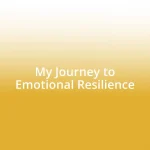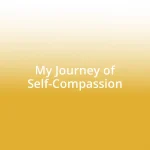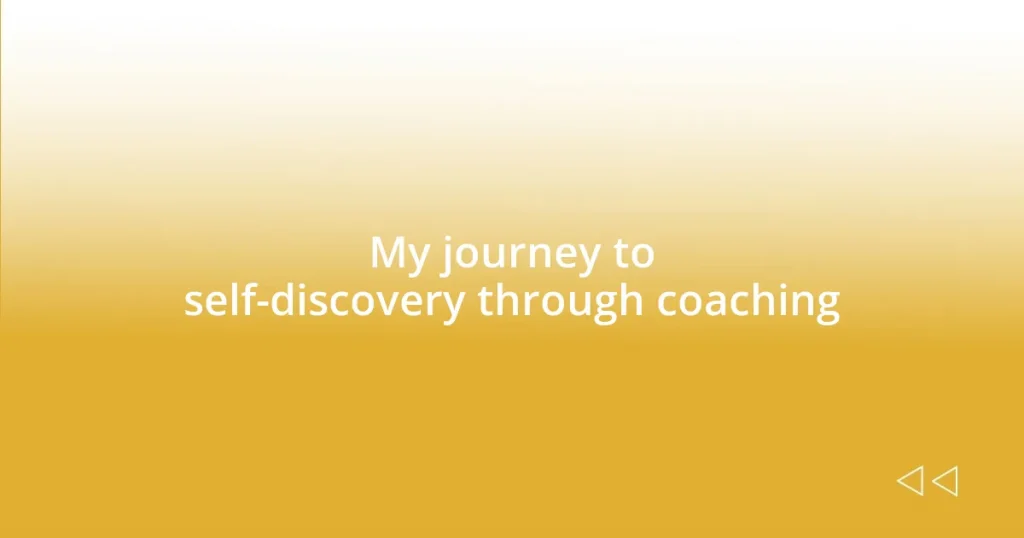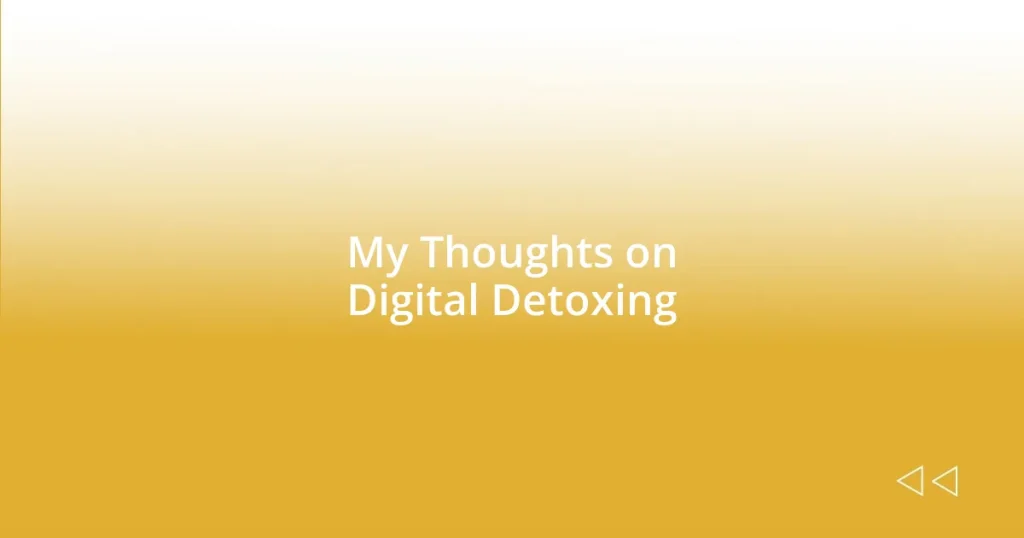Key takeaways:
- Self-discovery involves confronting emotions like fear and self-doubt, which catalyze personal growth.
- Coaching offers accountability, a safe space for exploration, and tools for ongoing self-improvement.
- Setting specific goals such as authenticity and emotional resilience fosters personal insight and liberation from unrealistic expectations.
- Integrating lessons into daily life through rituals and reflections enhances mindfulness and reinforces personal growth.

Understanding self-discovery process
Self-discovery isn’t a straight path; it often resembles a winding road filled with unexpected turns. I remember sitting across from my coach, feeling a mix of hope and uncertainty, as I navigated through layers of my identity I had barely scratched the surface of. Have you ever caught yourself wondering who you really are beneath the roles you play?
Emotions play a critical role in this journey. For me, it was the moment I acknowledged feelings of fear and self-doubt that became a catalyst for change. Reflecting on my past, I realized that embracing discomfort was necessary; it was through my willingness to confront these emotions that I unearthed the core of my true self.
It’s fascinating how our beliefs shape our self-perception. I encountered limiting beliefs that kept me trapped in a cycle of self-criticism. Asking myself, “What if I chose to view my mistakes as stepping stones rather than failures?” redefined my journey. Each small revelation felt like a gentle nudge towards a more authentic existence, helping me reinterpret my story in a way that empowered me to grow.

Benefits of coaching for growth
The benefits of coaching for growth are truly transformative. I remember the first session I had with my coach; it felt like unlocking a treasure chest of potential I didn’t know existed. With regular check-ins, I found myself setting and achieving goals that once seemed unattainable. It’s remarkable how having someone to hold you accountable can shift your mindset from self-doubt to self-empowerment.
Moreover, coaching provides a safe space to explore thoughts and feelings without judgment. There were moments when I opened up about my fears and insecurities, leading to breakthroughs that connected the dots in my life’s puzzle. One particular session, when I expressed my fear of failure, turned into a powerful realization that failure is merely part of the growth process—not the end of it. I left feeling lighter and more inspired to embrace challenges head-on.
Lastly, the skills learned through coaching extend beyond sessions. I’ve integrated tools for self-reflection and emotional regulation into my daily life, giving me the confidence to navigate obstacles with a clearer perspective. Each coaching conversation became a stepping stone, guiding me toward not just professional growth but personal enrichment as well. Have you ever thought about how empowering it might feel to face your challenges with newfound tools and insights?
| Benefits | Description |
|---|---|
| Accountability | Having someone to keep you accountable can significantly enhance your commitment to personal and professional growth. |
| Safe Space | Coaching provides a non-judgmental environment where you can confront your fears and insecurities openly. |
| Skill Development | The insights and tools gained from coaching can be applied in various aspects of life, fostering continuous self-improvement. |

Setting goals for self-discovery
Setting goals for self-discovery is like planting seeds in a garden; it requires intention and patience. I vividly recall creating my first set of goals, a mix of aspiration and trepidation washed over me. I had to confront the parts of myself I often shied away from, choosing instead to embrace them.
To effectively set these goals, I found it helpful to focus on specific areas of my life. Here’s what I discovered:
- Authenticity: I aimed to uncover what it truly meant to be myself, free from expectations and societal norms.
- Mindfulness: I wanted to cultivate a practice that allowed me to be present in the moment, promoting self-awareness and emotional clarity.
- Emotional Resilience: Setting a goal to understand and embrace my emotions transformed my view on vulnerability, leading to personal strength.
These goals not only defined my path but also acted as a mirror reflecting my progress. Each small accomplishment fueled my desire to dig deeper into my self-discovery journey.
As I continued along this path, I learned that goal-setting is not just about the destination. It’s also about the insights gained along the way. For instance, when I shifted my focus to personal growth rather than perfection, I felt a wave of relief wash over me. Embracing imperfection became a liberating experience. Setting goals with this mindset brought more joy into the process, allowing me to explore the depths of my identity without the weight of unrealistic expectations weighing me down.

Techniques for self-reflection
Self-reflection is a crucial practice that has helped me navigate my personal growth journey. One technique I found incredibly powerful is journaling. Every evening, I would carve out time to write about my thoughts, feelings, and experiences from the day. I often asked myself questions like, “What did I learn today?” or “How did I handle challenging situations?” This simple act of putting pen to paper allowed me to process emotions and gain clarity on my actions. I highly recommend giving it a try—you might be surprised at how much insight flows when you connect with your inner thoughts.
Meditation is another technique that has significantly contributed to my self-reflection. I remember the first time I sat in silence for just five minutes; it felt daunting yet refreshing. Over time, I gradually increased this practice, finding that focusing on my breath helped to ground me. During these moments, I often reflected on my values and goals, leading to deeper connections with myself. There’s something cathartic about sitting quietly, right? It creates space for self-discovery that often gets lost in the hustle of daily life.
Lastly, I found it beneficial to engage in conversations that prioritized vulnerability. Sharing my thoughts with a trusted friend or mentor opened the door to honest feedback and self-examination. I often posed open-ended questions like, “What do you see in me that I might be overlooking?” This perspective shifted how I perceived myself and helped uncover blind spots in my understanding. It’s amazing how a simple conversation can spark revelations, reinforcing the fact that self-reflection isn’t locked within—it thrives in dialogue with others.

Overcoming challenges in self-discovery
As I delved deeper into self-discovery, I faced the inevitable challenge of confronting my fears. I’ll never forget that moment when I had to sit with the uncomfortable realization that I had been avoiding parts of myself. It felt akin to standing at the edge of a cliff, weighing the risk of jumping into the unknown. But what I discovered on the other side was profound—embracing my fears opened up a pathway to growth I never anticipated.
Another obstacle was dealing with the external pressures that often cloud our self-image. I remember feeling inundated by social media’s incessant stream of “perfect” lives. It was discouraging, to say the least. However, by actively choosing to curate my online space, I began to find communities that resonated with my journey. Surrounding myself with voices that encouraged authenticity drastically shifted my perspective, reminding me that self-discovery is a deeply personal adventure, not a race against others.
Finally, I grappled with the challenge of letting go of old identities that no longer served me. There was a time when I clung to titles and roles that defined me, like a security blanket. Yet, in letting go, I found freedom. It’s incredible how shedding the weight of others’ expectations can lead to newfound clarity about who we are at our core. Have you ever felt that urge to break free from a label? Reading my story may encourage you to find your own path toward self-liberation, one small step at a time.

Integrating lessons into daily life
Integrating lessons into daily life requires ongoing commitment and mindfulness. One practice that transformed my routine was setting daily intentions. Each morning, I would choose a specific lesson I’d learned from my coaching sessions and consciously weave it into my day. For example, if I had recently focused on the importance of gratitude, I would find moments to express appreciation—whether it was thanking a colleague or simply savoring my morning coffee. This intentional focus made my lessons more tangible, enriching my daily experience.
I also found that creating small rituals significantly helped in cementing these lessons. Sometimes, I would take a few minutes to reflect on my day during a walk. It was during these strolls that I processed how I applied my newfound insights. Once, after a discussion about resilience, I was faced with a minor setback at work. Instead of reacting with frustration, I paused, remembered the lesson, and chose to approach the challenge with calm. That shift in response not only changed the outcome of my day but reinforced that I could actually embody the principles I was learning.
One of the most enlightening moments came when I began to document my progress. I started a simple ‘lessons learned’ section in my journal, where each week I would jot down moments where I successfully integrated a lesson. This exercise revealed a pattern in my growth and served as a visual reminder of how far I had come. Have you ever noticed how much motivation a little reflection can bring? I found that celebrating even the tiniest victories—like a mindful pause or a compassionate conversation—kept me inspired and engaged on my journey of self-discovery.















